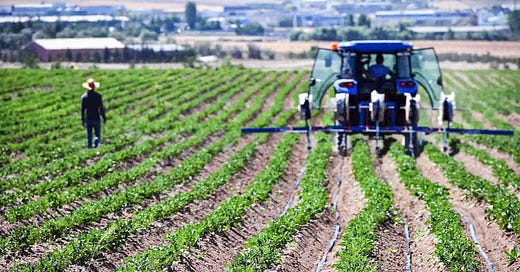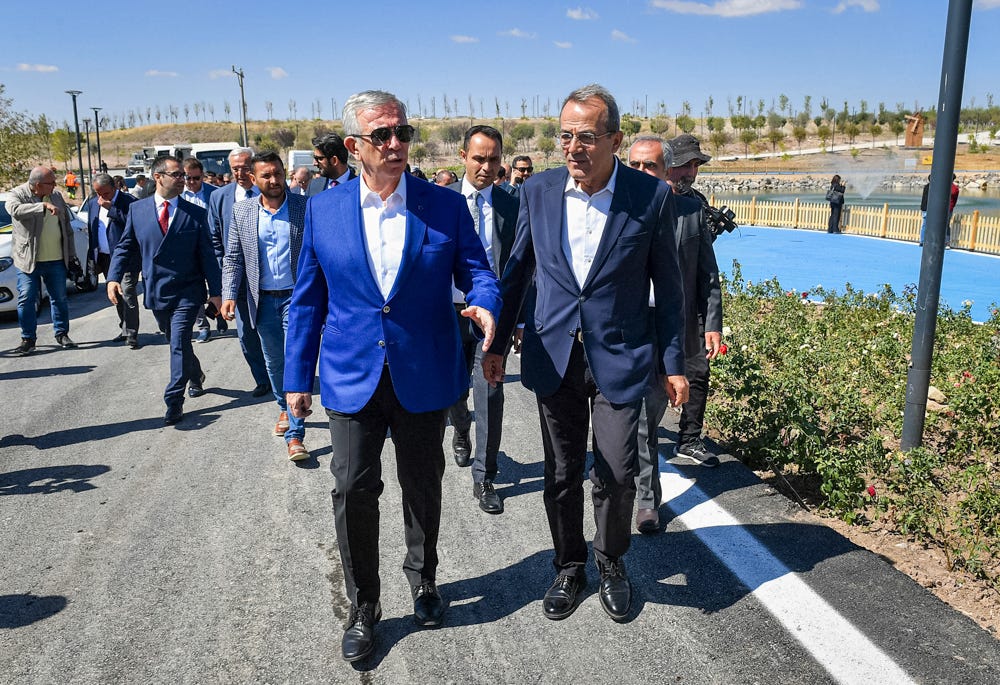Aiming for rural votes, municipalities support farmers but fall short on sustainability
ANKARA – Nearly 80 percent of voters in Turkey reside in metropolitan areas, but not all metropolitan areas are urban. They incorporate farm land and rural areas far from city centers after an amendment expanded metropolitan boundaries in 2014 and changed voter demographics.
As a result, metropolitan municipal candidates must appeal to both urban and rural voters, often with parallel promises of urban development and farming projects, as seen in many current campaigns in the run up to the March 31 local elections.
In Turkey’s 30 metropolitan municipalities, candidates are now aiming to boost rural support through fulfilled or promised agricultural programs that benefit farmers.
Though experts told Turkey recap the candidates’ narrow focus on agriculture production and employment offers limited solutions for a sector facing general workforce decline and growing climate change risks.
Both trends threaten the nation’s long-term food security and remain insufficiently addressed by past and present municipal initiatives.
Ankara’s agriculture move
As part of its core environmental projects, the Ankara Metropolitan Municipality (ABB) has worked to expand public green space in recent years, often outside city centers.
This push is spearheaded by the BAKAP Agricultural Campus, which spans 3.5 million square meters in the Karaoğlan neighborhood of Ankara’s Gölbaşı district, and includes a combination of public parks and agriculture space.
Previously designated as residential land by the former Ankara Mayor Melih Gökçek, the plot was converted back to agricultural use after the Republican People’s Party (CHP) Mayor Mansur Yavaş took office in 2019.
Gökçek, a member of the ruling Justice and Development Party (AKP), has accused Yavaş of devaluing the land from 810 billion TL to 10 billion TL, criticizing the current mayor for “lacking caliber”.
Nearly four years later, BAKAP hosts dozens of acres of fruits, vegetables and grains. The project provides food for citizens in need, and over the last three years has produced 2 million tons of tomatoes, cucumbers, peppers, beans, eggplants and potatoes, according to ABB data.
Additionally, 17,500 trees producing walnuts, apples, peaches, and many more have started bearing fruit on the farm this year.
Speaking to Turkey recap, Mekin Tüzün, head of the Rural Services Department of ABB, said the BAKAP project aims to provide secure food access for low-income citizens.
The project also seeks to help Ankara farmers “who have been forced to produce their crops at high costs and sell them at low prices,” Tüzün said.
Multiple members of the ABB Council did not respond to requests for comments on this report.
Sustainability questions
On a global scale, the world’s most polluting 100 cities produce 18-20 percent of all human-sourced carbon emissions. Turkey’s largest and second-largest cities, İstanbul and Ankara, rank 26th and 80th on the list, respectively.
Both cities have climate change action plans, but most environmental goals fall far short of their aims. In Ankara, green projects focus mostly on green space, like BAKAP, and less on initiatives that reduce carbon emissions, brown coal consumption or introduce drought-conscious water regulations.
Water management policies especially present direct threats to sustainable agriculture in Anatolia, where drought risks have risen sharply in recent years due to lower precipitation and unregulated water usage, often by farmers.
Some ABB projects do focus on mitigating climate risks, such as a “dry landscaping” initiative that replaced grass road medians with rock gardens, in turn reducing municipal areas in need of regular watering, though the impact is limited.
An ABB research and development team also works on hydroponic farming alternatives in an effort to protect farmers from the effects of climate change and increased water scarcity.
The project team told Turkey recap that they were expecting a positive response to their EU application to launch a new program designed to raise awareness among farmers and to better prepare them for a drier Anatolia.
Still, in their 2021 article published in the journal Birikim, Berra Zeynep Dodurka and Osman Savaşkan outline critical shortcomings in various projects developed and implemented by local governments across Turkey.
According to Dodurka and Savaşkan, the narrow focus on production and employment means neglecting the broader issues of rural development.
The article highlights that challenges in accessing public services, as well as the limitations of social and cultural opportunities, significantly impact people’s decisions on whether to reside in rural or urban areas.
In addition, another shortcoming the authors note is the necessity of a multilayered plan to mitigate the climate crisis.
“The development of agroecological solutions beyond conventional agriculture, which requires intensive use of chemical fertilizers and pesticides, needs to be addressed more urgently,” Dodurka told Turkey recap.
Dodurka went on to say central and local governments should be more coherent on climate goals and prioritize needs in a comprehensive manner. She added existing local projects are still better than nothing.
One example is a small ABB project that covers the partial cost of organic fertilizers for local farmers.
Against the grain
For context, the borders of metropolitan municipalities in Turkey were designated as provincial administrative boundaries with Law No. 6360, which was adopted in 2012 and entered into force after the 2014 local elections.
Also known as the “Metropolitan Law”, the legislation transformed villages and some towns within provincial borders into ‘urban’ neighborhoods, and 16,220 villages and 1,053 towns fell under the authority and responsibility of metropolitan municipalities.
According to Ali Ekber Yıldırım, a journalist experienced in covering agricultural issues, the amendment, despite still having some problems, “has come with the obligation for almost every municipality – regardless of party affiliation – to pay more attention to agriculture and rural areas”.
Yıldırım told Turkey recap that while some municipalities are doing “larger, more significant work” on agricultural investments and incentives, the impact of some projects remains limited but overall positive.
“When I look at election promises, I see municipalities promise fuel and seedling support,” Yıldırım said. “They go to farmers and tell them about their services.”
“The borders of the city were changed … so whatever projects a mayoral candidate in İzmir promises for the citizens of [downtown] Alsancak, they have to keep the same discourse in a village of [rural] Ödemiş.”
Still, larger workforce trends present new challenges for Turkey’s agriculture sector as more young citizens opt for jobs in city centers instead of working in the fields.
According to official data, the number of registered farmers in Turkey decreased by 55 percent in the 2010s. Over the same decade, the nation’s total area of agricultural land decreased by 5 percent.
In July 2023, data from the Turkish Union of Chambers of Agriculture also showed the people engaged in agriculture were getting older.
The Ankara municipality is aware of this trend.
Last year, the BAKAP project specifically supported women producers, but the municipality’s aim for this year is to support young livestock producers under the age of 40.
“Our main focus is on small family businesses,” said Tüzün from ABB. “We support families so they won’t have to leave [agricultural] production and move away from their villages. By doing so, we also ensure rural development.”
Oğul Köseoğlu translated this article from Turkish.
This newsletter is supported by readers via Substack and Patreon. Paid subscribers get full access to our recaps, reports, members-only Slack and more. We also have pun-tastic merch. All proceeds go towards sustaining our journalism.
Turkey recap is an independent news platform produced by the Kolektif Medya Derneği, an İstanbul-based non-profit association founded by our editorial team to support and elevate news media and journalists in Turkey.
Get in touch: send pitches, queries and feedback to info@turkeyrecap.com.
Diego Cupolo, Editor-in-chief @diegocupolo
Gonca Tokyol, Editor-at-large @goncatokyol
Ingrid Woudwijk, Managing editor @deingrid
Verda Uyar, Digital growth manager @verdauyar
Sema Beşevli, Editorial intern @ssemab_
Onur Hasip, Editorial intern @onurhasip
This article is part of a series of environmental reports produced with support from the Heinrich Böll Stiftung Turkey Office, and in no way can be interpreted to reflect the views of the Heinrich Böll Stiftung.








